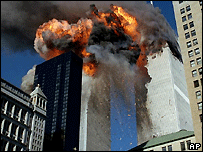Five years on from the 11 September attacks, the BBC's former New York business correspondent Stephen Evans speaks to the head of the company hit hardest in the destruction of the World Trade Center.
Investment bank Cantor Fitzgerald was one of the largest in the world, with its headquarters on the 101st to the 105th floors of the North Tower.
When the first plane struck just as the working day started, 658 employees were killed, more than in any other organisation, including the Fire Department of the City of New York.
It is still in business (in Midtown, Manhattan, employing more people now in New York than it did then), but there is a lot of pain in the company. Howard Lutnick, Cantor's chairman and chief executive, survived only because he arrived at work later than normal, having taken his son to his first day in senior school.
Howard's brother, Gary who also worked for Cantor, died (he'd phoned their sister, Edie, and she said "Thank God, you're not there", to which he replied that he was).
Tough decisions
Cantor Fitzgerald is now growing fast, and that's probably because of a tough, hard decision Howard Lutnick took immediately after the attacks: he stopped the pay of all employees, living and dead. He explained it as needing to let the bankers know that he was in control.
Whatever its business merits, it was a public relations disaster, even though Cantor and Lutnick decided on 19 September to devote a quarter of the firm's profits to the victims, something it's done ever since.

Cantor Fitzgerald was located close to the impact of the first plane
|
Mr Lutnick told the BBC: "Of course we weren't paying their salaries. The bank wouldn't let us pay their salaries. It's an absurd concept to pay two thirds of your staff who were just killed, their compensation and expect to be in business".
Mr Lutnick, who only narrowly escaped the collapse of the towers, is a fascinating man.
A year after 11 September, 2001 he gave interviews to the BBC in which he seemed remote, almost as though he hadn't been involved, let alone lost a brother and 658 employees and very nearly a big company.
He explains it now as having "compartmentalised" his mind, just focusing on each task as it came at him.
"I would describe it like being on a surf board on a giant wave, and that if you ever looked back, the wave would get you and maybe I wouldn't be able to function.
"So my objective during the first year was just to keep my head down and run forward because there was always something to do. The business issues were literally mayhem.
Endless funerals
"The family trauma and the family issues for so many people who'd lost their breadwinner, lost their loved one, and needed financial help, needed emotional help, needed support was just enormous.
"I went to 20 funerals a day for 35 days. So there were times I couldn't even go to my great friends' funerals. One day, my best friend's brother was being buried at the same exact time as my room mate from college's brother. So my wife went to one and I went to one."
Five years after the event that triggered a huge personal and business trauma, Mr Lutnick is a driven man: "We said we would take care of the families and that's what we did.


~RS~q~RS~~RS~z~RS~13~RS~)